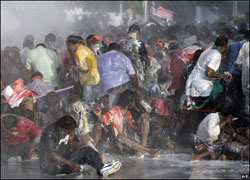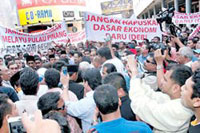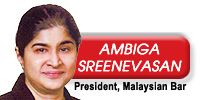|  ©The Sun ©The Sun
Down2Earth by Terence Fernandez
HAVE you ever been on the wrong end of a water cannon? What about being in the vicinity of active teargas canisters? From covering street protests a decade ago, I can tell you it is not a pleasant experience. Apart from the obvious clamminess of being drenched, there is also the danger of being flung backwards a few metres by the sheer force of the jet streams coming at you at 300 gallons a minute. A good dose of Clorox will be needed to remove the yellow, red or blue stains – a product of the dye that is sometimes added to the water, to mark the protesters, so that the ground force will be able to pick them out.  A concoction of a peppe-rlike substance and even soap may be added for extra “oomph!” to sting the eyes and irritate the skin and throat. A concoction of a peppe-rlike substance and even soap may be added for extra “oomph!” to sting the eyes and irritate the skin and throat.
Where teargas is concerned, your eyes will begin to smart and then tear, your nose becomes runny, your throat gets parched, you begin coughing, nausea overwhelms you and in extreme cases, you start vomiting. If you’re asthmatic, there is the immediate danger of suffering an attack. You may also experience a burning sensation on your skin, while dizziness and disorientation is also a known side-effect. Well, there are others who of late have had similar experiences like me. They include the 2,000 people who gathered at the Kuala Lumpur City Centre (KLCC) last March to protest against the high price of fuel and essentials; and the 140,000 Malaysians (although the official figures vary from 4,000 to 40,000) who marched in the Golden Triangle in early November seeking free and fair elections in the Bersih-initiated march. Then of course there were the 10,000 ethnic Indians who swarmed the streets of Jalan Ampang and the 1,000 holed up in the Batu Caves temple compound late November to highlight the plight of their community through the Hindu Rights Action Force (Hindraf) demonstrations. Most recently 300-odd Hindraf protestors in Jalan Raja Laut got wet in last month’s “rose march”. The authorities and the leadership decided that these street demonstrations which are “not our culture” had to be quelled as they were detrimental to the economy and were scaring tourists away. Teargas and water cannons had to be employed immediately to prevent the situation from getting any worse. It is undeniable then when emotions are high and when a large group of people congregate in a highly-charged atmosphere, there are chances of people getting hurt. There is also the possibility of certain characters taking advantage of the situation for their own agenda. So perhaps, the authorities were justified in putting a swift and one may argue, callous, end to this mass expression of disapproval. Now, I was half expecting the 1,000 people who gathered outside Komtar in Penang and the 500 outside the Selangor State Secretariat in Shah Alam last week to protest against the decision of the new governments of both states to review the New Economic Policy (NEP), to join their KLCC, Bersih and Hindraf brethren in exchanging tales of being sprayed and tear-gassed. Unfortunately, they were robbed of this opportunity to trade anecdotes over a glass of teh tarik or kopi jantan, thanks to the unexpected restraint showed by the law enforcement authorities.  In the case of Komtar, water cannons were deployed but never used, while in Shah Alam, all that happened was the seizure of loud-hailers from the protesters’ leaders. Just like the earlier protests, these two demonstrations too, did not have a police permit. In the case of Komtar, water cannons were deployed but never used, while in Shah Alam, all that happened was the seizure of loud-hailers from the protesters’ leaders. Just like the earlier protests, these two demonstrations too, did not have a police permit.
While five Hindraf leaders are being held under the Internal Security Act (ISA), those arrested in Penang were released the same day. Now, the different treatment of the Hindraf, Komtar and Shah Alam protests is telling since the motives of the protestors were similar – each group demanding what’s due to them and highlighting the problems of their respective communities. It must be said that the dissimilar enforcement on the different groups of protestors gets one to thinking that the authorities are playing favourites since the protests in Penang and Shah Alam were against an “Opposition” government. This suspicion is further compounded by the fact that the latest protests were organised by a political party. Outside Komtar last week, just like in Kuala Lumpur last year, traffic was obstructed, businesses suffered for a while and the mass assemblies were witnessed by tourists. But this time, all we heard from the powers-that-be was that “they are merely demanding for their rights to be protected”. There was no such “this is bad for the economy” rhetoric. Now, I am sure many Malaysians like me are stumped. Just when does a demonstration become an acceptable icon of the democratic process, and when does it become a threat to national security? There are those better equipped than this journalist to answer this question. But while I continue scratching my head, it would be good to ponder on the fact that for a leader, meting out justice and fairness is not a personal choice but a compulsory requirement to indicate that all are equal under the law. A very confused Terence is deputy news editor (special reports & investigations) and is reachable at terence@thesundaily.com |  Menteri besar Mohammad Nizar Jamaluddin berkata tatacara dan kaedah pemilihan itu akan disampaikan kepada semua ketua kampung dan pegawai daerah tidak lama lagi.
Menteri besar Mohammad Nizar Jamaluddin berkata tatacara dan kaedah pemilihan itu akan disampaikan kepada semua ketua kampung dan pegawai daerah tidak lama lagi. The Bar Council is deeply concerned that the new Menteri Besar of Selangor, Tan Sri Khalid has announced that he will continue on the path embarked upon by his predecessor to eradicate all squatter settlements in the State.
The Bar Council is deeply concerned that the new Menteri Besar of Selangor, Tan Sri Khalid has announced that he will continue on the path embarked upon by his predecessor to eradicate all squatter settlements in the State.
 He said expectation was now high to push for local elections since the opposition has pledged to restore them through their manifestos before the general election.
He said expectation was now high to push for local elections since the opposition has pledged to restore them through their manifestos before the general election. It has been over 40 years since the government outlawed local council elections through the Local Government Act 1976. Local polls were suspended following
It has been over 40 years since the government outlawed local council elections through the Local Government Act 1976. Local polls were suspended following "We are very disappointed that he has made such a serious pronouncement as the Selangor MB without sufficient consultation and discussions with the wider community of residents’ groups, civil society organisations and especially the urban poor settlements themselves about their housing and land issues," he said.
"We are very disappointed that he has made such a serious pronouncement as the Selangor MB without sufficient consultation and discussions with the wider community of residents’ groups, civil society organisations and especially the urban poor settlements themselves about their housing and land issues," he said. In remarks written by him which was published today by English daily The Sun, Mahathir said the dismissal of former Lord President Mohd Salleh Abbas and Supreme Court judges Wan Sulaiman Pawanteh and George Seah were not his doing.
In remarks written by him which was published today by English daily The Sun, Mahathir said the dismissal of former Lord President Mohd Salleh Abbas and Supreme Court judges Wan Sulaiman Pawanteh and George Seah were not his doing. “The person asking that the government should apologise for what happened to Tun Salleh Abbas may have forgotten that as President of the Muslim Lawyers Association, he fully supported the action that was taken,” said Mahathir.
“The person asking that the government should apologise for what happened to Tun Salleh Abbas may have forgotten that as President of the Muslim Lawyers Association, he fully supported the action that was taken,” said Mahathir. It was also alleged that Prime Minister Abdullah Ahmad Badawi had “influenced” former MB Idris Jusoh who was responsible for such a state of affairs and from which he had “benefitted financially”, said Mahathir.
It was also alleged that Prime Minister Abdullah Ahmad Badawi had “influenced” former MB Idris Jusoh who was responsible for such a state of affairs and from which he had “benefitted financially”, said Mahathir.
 ©
© A concoction of a peppe-rlike substance and even soap may be added for extra “oomph!” to sting the eyes and irritate the skin and throat.
A concoction of a peppe-rlike substance and even soap may be added for extra “oomph!” to sting the eyes and irritate the skin and throat. In the case of Komtar, water cannons were deployed but never used, while in Shah Alam, all that happened was the seizure of loud-hailers from the protesters’ leaders. Just like the earlier protests, these two demonstrations too, did not have a police permit.
In the case of Komtar, water cannons were deployed but never used, while in Shah Alam, all that happened was the seizure of loud-hailers from the protesters’ leaders. Just like the earlier protests, these two demonstrations too, did not have a police permit. "We certainly lost the Internet war, the cyber-war," Abdullah said in in a speech to an investment conference.
"We certainly lost the Internet war, the cyber-war," Abdullah said in in a speech to an investment conference.



